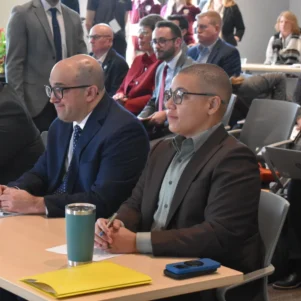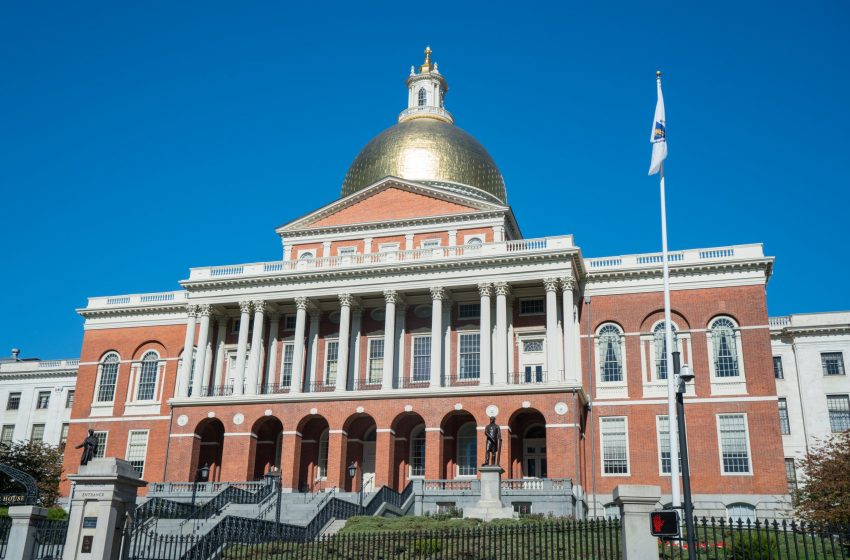Early Sunsets, Health Effects Cited by “Boston Time” Backer
By State House News Service | January 11, 2017, 20:20 EST
STATE HOUSE – The rest of the country may already think that Boston — the Hub of the Universe — runs on its own time. But Wednesday a legislative commission met to consider actually shifting the Bay State into a different time zone than the rest of the eastern seaboard.
The commission, which lawmakers agreed to form last year, is charged with studying how shifting permanently to eastern daylight time — the time zone that Massachusetts observes between March and November — would affect the state’s local and regional economies, its education system, public health, transportation, energy consumption, commerce and trade.
“What that would mean is staying in what is currently our summer time zone, if you will, during the winter months,” said Sen. Eileen Donoghue, who Wednesday was voted to serve as the commission chairwoman.
WATCH:Sen. Eileen Donoghue and Rep. Michael Finn look on as Rep. Paul Frost expressed concerns about a proposal to shift the state’s time zone at the first meeting of a commission tasked with studying the issue.
Massachusetts now shifts onto eastern daylight time each year from the second Sunday in March to the first Sunday in November, and during the late fall and winter the state reverts to its usual eastern standard time, which is one hour behind eastern daylight. Remaining on eastern daylight time – observed in the summer – year-round would put Massachusetts at odds with its New England neighbors and New York and other states.
The commission was embedded in a $1 billion economic development bill passed by the Legislature and signed by Gov. Charlie Baker last summer. Its origin, though, stretches to a 2014 op-ed Quincy resident Tom Emswiler wrote in the Boston Globe arguing that Massachusetts should join eastern Canada, the Caribbean and parts of South America on Atlantic Standard Time, another name for eastern daylight time.
Emswiler said he was distraught when he moved to Massachusetts in 2011 and realized that the sun set around 4:10 p.m. in the winter months. So, with his background in health policy administration, Emswiler set out to learn more about the effects of our current time zone format.
“If you review the public health literature, it is clear that the time shift causes health effects — whether it’s more heart attacks, more car accidents — these are real public health issues,” he said after Wednesday’s commission hearing. He added, “One study that I cited in my original op-ed two years ago said that we would save as many as 366 lives a year, which is as much as saving a life a day.”
Rep. Paul Frost, an Auburn Republican, said he has a number of concerns about shifting the state’s time zone and that he will keep an open mind about the proposal but will “play more of the role of the skeptic” on the commission.
Among the concerns Frost listed were school children walking to school in the dark as the time zone shift pushes daylight hours later in the day, solar glare in the eyes of commuters with rush hour occurring while the sun is at a different angle in the sky, the confusion that would likely accompany such a change, and “Massachusetts being an island, doing this on their own.”
“How is that going to work if Massachusetts were to do this all by itself with no other New England states, nobody else in the Northeast or nobody else on the East Coast? Frost asked. “We’re basically going to be creating a Boston time … basically from November to March, and from November to March we’re going to have a different time than everybody else around us.”
Rep. Michael Finn, a West Springfield Democrat, said he had not given much thought to the state’s time zone until House Speaker Robert DeLeo appointed him to serve on the special commission.
It was “something I just took for granted and did every year and make sure I tried to be on time as best I could,” Finn said.
The commission so far includes Donoghue; Reps. Finn, Frost and Daniel Cahill; Emswiler; Peter Shattuck of the Acadia Center; meteorologist Kyle Martin; Tim Miley of the Department of Public Health; Assistant Secretary for Career Education Robert LePage; and John Warren, of Reebok.
Wednesday’s initial commission hearing was attended by more reporters than commission members or members of the general public, a sign that Emswiler’s idea has attracted more attention outside the State House than within it.
“I think I’m not alone in thinking that a 4 p.m. sunset is a drag,” Emswiler said when asked what it was about his proposal that captured people’s interest.
The commission is supposed to have its final report and legislative recommendations completed by March 31, but Donoghue said Wednesday that because the commission got a late start the final product may not be ready by March 31. She pledged the commission would wrap up its work sometime this spring.
If the commission recommends changing how the Bay State sets its clocks the change would also have to be approved by Gov. Charlie Baker, who last year said he has no issue with the current time zone.
“I think the time zones we have are fine and they’ve been fine for a very long time,” Baker said in August. “I especially worry that if we head too far down this road we could end up creating a lot of problems for ourselves with respect to all sorts of issues around work schedules, commuting schedules and a whole bunch of other things.”
— Written by Colin A. Young











